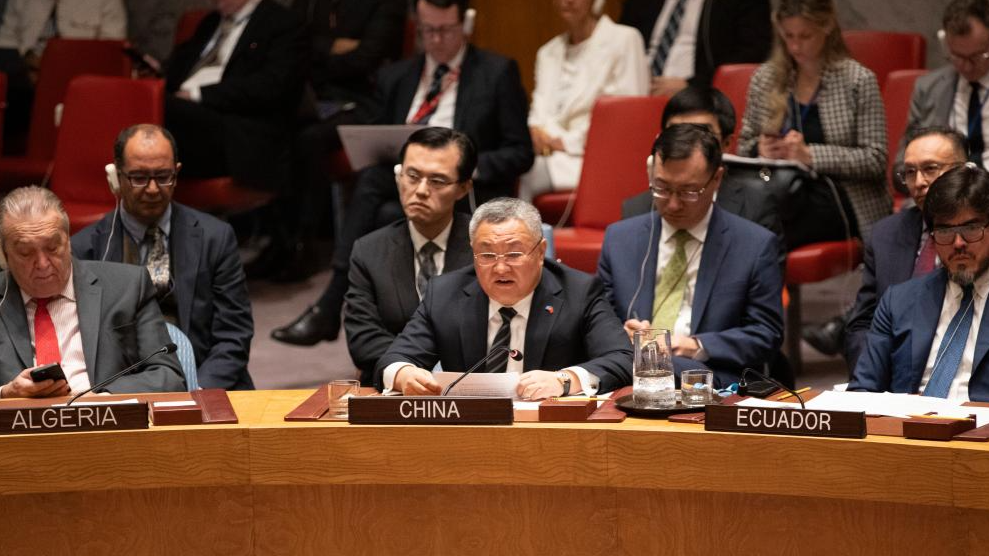
UNITED NATIONS — At the Security Council briefing on Oct 2, China called on the UN Security Council to take urgent actions to de-escalate the Lebanese-Israeli situation.
Fu Cong, China’s permanent representative to the United Nations, said that under the current circumstances, the Security Council must take urgent actions and be united in making clear and unequivocal demands: an immediate cease-fire must be established in Gaza; the de-escalation of the Lebanese-Israeli situation must be advanced to stop the cycle of violence; every effort must be made to prevent the spread of the fighting; and the parties concerned must return to the track of political and diplomatic solutions.
Warning that the current situation is “hanging by a thread”, Fu said any passive procrastination would be irresponsible, and any rhetoric of condoning further military adventurism would send a wrong message and could cause serious consequences.
“We hope major countries with influence will adopt a sincere and responsible attitude and earnestly play a constructive role to avoid further escalation of the situation,” he said.
Fu noted that the conflict has caused an unprecedented humanitarian disaster, with Gaza having become “a hell on Earth”, and massive destruction of civilian facilities, thousands of casualties, and more than 1 million people displaced in Lebanon.
The ambassador called on all parties to the conflict to respect the red lines of international humanitarian law and to earnestly ensure the protection of civilians.
Lebanese leaders on Oct 2 renewed the country’s commitment to the joint US-French call for an immediate cease-fire, and agreed to initiate steps to implement UN Security Council Resolution 1701.
UN Resolution 1701 of 2006 put an end to the 33-day war between Israel and Hezbollah. It stipulated a cessation of hostilities, the withdrawal of Israeli forces from Lebanon, and the deployment of an additional force in the United Nations Interim Force in Lebanon to monitor the cessation of hostilities.
Israel continued airstrikes in central Beirut, southern Lebanon, Gaza and Syria, causing more casualties and significant damage to houses, schools and vehicles, al-Jadeed local TV channel reported. Israeli ground troops suffered casualties in southern Lebanon.
In his visit to Qatar, following a meeting with Qatari Emir Sheikh Tamim bin Hamad Al Thani, Iranian President Masoud Pezeshkian said on Oct 2 that Iran does not seek war, but will respond if Israel acts against the country.
Iran fired a barrage of missiles at Israel on the evening of Oct 1 in response to previous assassinations of Iranian leaders by Israel and the Israeli offensive in Palestine and Lebanon. Iran’s Islamic Revolutionary Guard Corps, or IRGC, said the Iranian missile attacks were in retaliation for assassinations carried out by Israel and crimes committed in Palestine and Lebanon.
At a cabinet meeting in a secure bunker near Jerusalem in the aftermath of the attack, Israel’s Prime Minister Benjamin Netanyahu warned that Teheran made a “big mistake tonight” and vowed that “it will pay for it”, according to The Times of Israel.
Mohammad Khajooei, an Iranian analyst on the Middle East issues, said Iran is in a state of “full vigilance” after its missile strike on Israel and is watching carefully not to fall into an Israeli trap that could drag Teheran into an all-out regional war. Cheering local residents took to streets in cities.
Muslim Imran, director of the Asia Middle East Center for Research and Dialogue in Malaysia, noted that Iran sought to create space for diplomacy and initiate a cease-fire, but Israel has kept ignoring international law and UN, believing it was entitled to escalate its aggression due to the full backing from the United States.
Mike Gu and Jan Yumul in Hong Kong, and Mohammad Reza Manafi, a freelance journalist in Teheran, contributed to the story.


